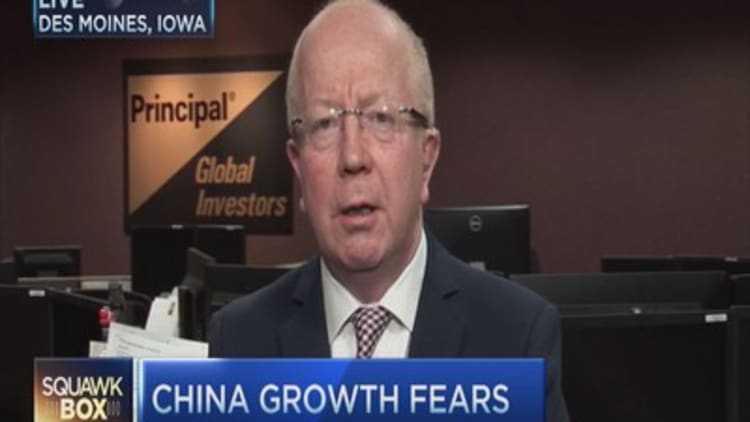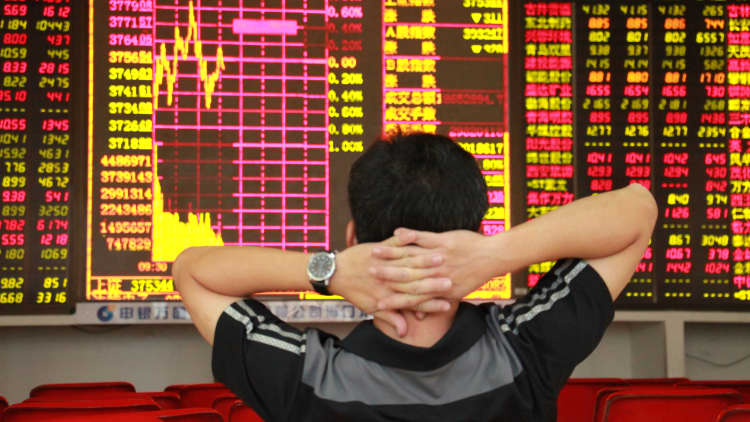


A new Asian currency war and a delayed Federal Reserve rate hike; these are the potential market-shaking implications of Beijing's decision to devalue the yuan, strategists told CNBC.
"If they are true to their word today and this is a new regime for the fixed mechanism, we might think about using the word 'floating' associated with the Chinese exchange rate—that's a massive change," noted Richard Yetsenga, head of global markets research at ANZ, referring to Tuesday's announcement by the People's Bank of China to allow the yuan to depreciate as much as 2 percent against the U.S. dollar.
Read MoreChina central bank shocks with yuan devaluation
The move took global traders by surprise, with many pointing to weak July trade data, the recent stock market rout's spillover impact on consumption, and aspirations for inclusion into the International Monetary Fund's Special Drawing Rights basket as factors motivating Beijing.
"It's an interesting move which means several things: when the People's Bank of China first started lowering interest rates and reserve requirements, that freed up bank lending, which likely went to stocks. Now this yuan re-engineering will help companies that represent the greater economy, i.e. exporters, not just companies heavily weighted in stock markets," explained Nicholas Teo, market analyst at CMC Markets.
New easing wars
China may be focused on becoming more market-oriented, but Tuesday's announcement is the latest in a series of competitive devaluations in Asia and other emerging markets, traders said.
"Clearly, this is a shock to the rest of Asia. If you look at China's top trading partners—Korea, Japan, the U.S. and Germany—this is a competitive hit to the exports of those countries. China is exporting disinflation to countries who receive Chinese exports. This is especially negative for Asia currencies," noted Callum Henderson, global head of FX Research at Standard Chartered.
Indeed, the region's reaction to Tuesday's announcement was swift and severe. As the yuan tumbled as much as 1.8 percent against the greenback, the Korean won (KRW), (SGD), and Australian dollar all sank more than 1 percent.
"Other Asian countries will see today as a competitive devaluation from China. Currencies like the KRW and SGD are the most in the firing line, in our view. In North Asia, Taiwanese and Korean authorities are anyway on the record for preferring weakening currencies. In Singapore, the October monetary policy meeting will now increasingly be in focus for a potential weakening move," JPMorgan said in a report on Tuesday.
Global central banks excluding the U.S. engaged in an easing war early this year in order to stem deflation and protect their economies from sinking oil prices and an advancing greenback ahead of a widely anticipated U.S. interest rate hike this year.

"We've been in a competitive state of easing all year and China's announcement today indicates the easing wars are a spiral that won't end until global economic growth picks up," Teo warned.
However, banks including Standard Chartered and ANZ were quick to warn that Tuesday's move was likely a one-off adjustment and further yuan devaluation wasn't likely, which should ease the pain on Asian currencies going forward.
"Given we believe that China is not aiming to engineer a much weaker renminbi (RMB), the sharp depreciation pressure on Asian currencies from today's CNY fixing change should fade. That said, we believe the likelihood of USD-RMB trading with elevated volatility implies that other USD-Asian exchange rates should be more volatile too," HSBC said in a report on Tuesday.
Impact on the Fed
Tuesday's move could also see the Federal Reserve shelve plans for rate-liftoff in September, according to some investors.
The yuan and the U.S. dollar were the only two strengthening currencies left amid recent global monetary easing but now that China is finally easing across the board, the greenback is the only one left, explained Jim Rickards, chief global strategist at West Shore Funds.
"Today's yuan move now means the U.S. will support all the deflation in the world. Everybody's trying to get inflation via easing, which means they are exporting deflation to the stronger currency."
Continued dollar strength is problematic for the Fed since it hurts U.S. exports, lowers inflation and dampens corporate profits. Because raising interest rates will likely only further push up the dollar, the central bank is in a key dilemma. As of Monday, the likelihood of a rate hike in September was 54 percent, according to the CME FedWatch tool.
"Now, even a small increase in rates in September could have a magnified effect on the value of the U.S. dollar, we'll have to wait and see what the Fed does," said John Carey, portfolio manager at Pioneer Investments.

